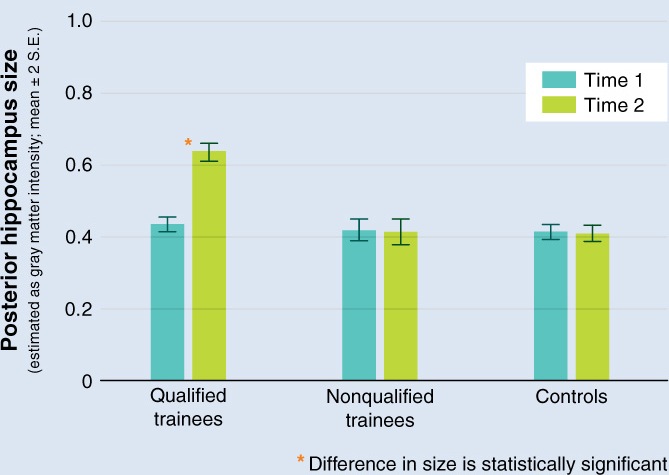“Use it or lose it.” A frequent assertion by weightlifters in reference to their muscles. But can the same be said about the memory-
There is a type of brain scan called functional MRI, or fMRI, that can visualize the size and activity of different brain structures. Using this scanning technology, researchers have investigated how individuals’ brains change over time. They began, as many scientists do, with an interesting question: Can environmental stimulation improve your brain’s abilities? This is an important question, but perhaps too general for tackling in a single, carefully controlled experiment
How could you set about answering this question for a real-
Using a common strategy, the researchers refined the broad question into something more testable: Does acquiring and mastering a large and complex body of knowledge measurably change your brain anatomy? Maybe the cleverest part of the research plan was their identification of a population well-
Armed with their powerful observational tool—
Why would people who don’t drive cabs be interested in this result?
These findings were consistent with the hypothesis that learning “The Knowledge” creates new neurons due to the greater demands placed on the posterior hippocampus as cabbies navigate and learn the streets of London. But the results are of interest to people far beyond the world of cab drivers. If enduring structural changes in the brain can be induced by behaviors, that bodes well for the potential long-
How much confidence can we have in this conclusion?
With such widespread interest in these findings, it’s not surprising that many people were cautious about immediately drawing broad conclusions. One issue in particular aroused skepticism. The study results are also consistent with an alternative (less interesting or exciting) hypothesis. Maybe cab driving doesn’t make your hippocampus bigger. Maybe, instead, people differ innately in posterior hippocampus size and those with a larger hippocampus are simply predisposed to be successful cab drivers. The original study did not allow researchers to distinguish between their original hypothesis and this alternative hypothesis.
955
Is there an experimental approach that would make this possible? Yes! It’s called a longitudinal study. What if you studied individuals as they trained to become cab drivers, measuring their posterior hippocampus size before and after they acquired The Knowledge?
How would a longitudinal study resolve uncertainty about why cabbies have a larger posterior hippocampus?
If posterior hippocampus size is increased as a result of acquiring The Knowledge, the hypothesis that brain changes can be induced by behaviors is supported. If posterior hippocampus size is not increased by acquiring The Knowledge, the hypothesis supported is that some people have a larger hippocampus, and those people are predisposed to succeed as cab drivers.
Clearly, a longitudinal study is more useful than the initial approach. So why were the first “cross-
We can answer this question with three words: faster, easier, cheaper. Based on the promising but ambiguous results from the initial experiment, however, the researchers decided to design and conduct a longitudinal study with 79 people training to become London cabbies (as well as 31 control participants, not undergoing the training.) For each participant, the researchers recorded several measurements, including assessments of memory. They also determined the volume of each individual’s hippocampal gray matter, using fMRI. They collected these data at two time points: T1, at the beginning of training, and T2, four years later, just after qualification for a license.
Which aspects of a longitudinal study make it more difficult to carry out than the earlier cross-
Of the original 79 trainees, 59 returned for the post-
Based on the trainees’ license examination performance, the participants could be divided into three groups: group Q, trainees who qualified for their license (having mastered The Knowledge); group F, trainees who failed to qualify for their license; and group C, controls who did not undergo the training.
No hippocampus size differences were detected among the three groups prior to the start of training. In other words, the groups started out on equal terms. At T2, however, some definitive and dramatic results from the longitudinal study became clear.
- 1. Those who qualified—
group Q— had a greater posterior hippocampus volume at T2 than at T1 (and a greater volume than participants in groups F and C at T2). - 2. Those in groups F and C showed no change in posterior hippocampus volume at T2 relative to volume at T1.
Additionally, those who qualified (Q) were found to have spent an average of twice as many hours per week in training as did those who did not qualify (F). The qualifiers also scored significantly higher on tests of spatial memory at T2 than did groups F and C (which did not differ from each other).
The impact on hippocampus size of acquiring The Knowledge is quite clear when presented graphically:

956
What can you conclude from these results?
In contrast to the conclusions they could draw from the initial cross-
The researchers also thought a more general conclusion was warranted—
If the results from the cross-
Does your answer to this question support the idea that cross-
The researchers also reported that retired cabbies’ posterior hippocampus volume and performance on memory assessments were “normalized”—that is, indistinguishable from those of non-
TAKE-HOME MESSAGE 23.19
Longitudinal and cross-
What implications do the results of the study investigating the impact of intense cognitive training on brain growth have for people other than cab drivers?
The results have far-ranging implications. They suggest that environmental stimulation can improve the brain's ability and, at least in certain parts of the brain such as the hippocampus, new neurons can be added. This is highly relevant for exploring diseases that affect the brain (such as Alzheimer's and senile dementia), rehabilitation after illness or injury that impacts the brain, the potential long-term benefits of educational interventions, and general improvement of cognitive functioning.
957